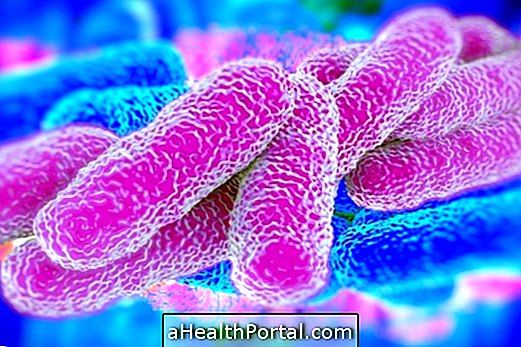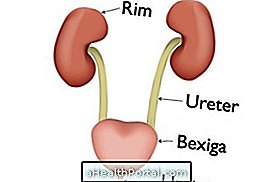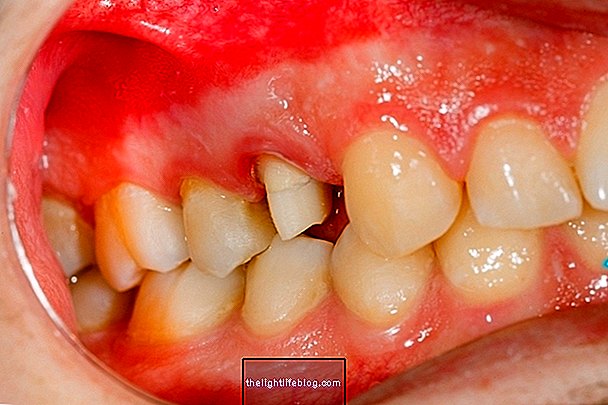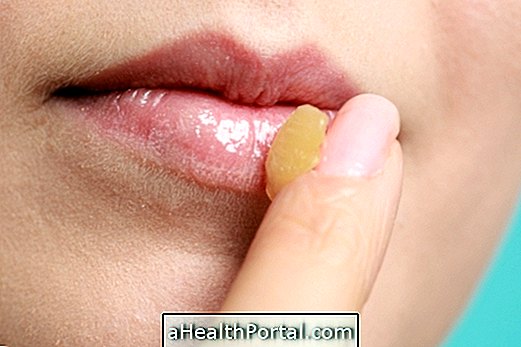Urinary tract infection is usually caused by the development of E. coli bacteria in the urinary tract.
This type of bacterium exists naturally in everyone's gut, however, some simple factors such as doing intimate hygiene incorrectly or not drinking water during the day, for example, make it easier for the bacteria to enter the urinary tract, causing the infection.
Often this infection goes unnoticed and the body can fight it naturally, but when symptoms of pain or burning appear when urinating, for example, it is necessary to seek the doctor and start the appropriate treatment. See all the symptoms here.

The main causes of urinary tract infection include:
1. Hold the pee for a long time
In addition to eliminating excess fluids and toxins from the body, urine helps clean the walls of the urethra, eliminating bacteria that may be rising up to the bladder. Therefore, holding the pee prevents this natural cleansing process from happening, facilitating the development of bacteria.
In addition, when too much urine accumulates, the bladder becomes more dilated and can not contract completely when the toilet is finally used. When this happens, a little urine can still remain inside the bladder, increasing the risk of bacterial growth and infection.
2. Doing the intimate hygiene incorrectly
One of the places that has the most bacteria capable of causing a urinary infection is the intestine, so to clean the intimate area you should always pass the toilet paper from front to back, avoiding to bring bacteria that are in the region of the butt, especially after use the bathroom. See other 5 rules for doing intimate hygiene and avoiding diseases.
Although this is one of the major causes of urinary tract infection in women, it can also occur in man, especially during bathing, when first washing the gluteal region before the penis, for example.
3. Drinking little water during the day
In the same way that holding the pee for a long time can facilitate the development of bacteria in the urethra and bladder, drinking little water during the day can also have the same effect. This happens because the body fails to produce enough urine to use the toilet several times during the day, allowing bacteria, which would be eliminated through the urine, to continue to rise to the bladder.
Thus, it is advised to drink at least about 2 liters of water per day to keep the urinary system healthy. Understand better how much water you should drink each day.

4. Using absorbents for a long time
The internal absorbents, as well as the panties, are a great way to maintain hygiene during the menstrual period. However, when they become dirty they facilitate the development of bacteria that can reach the urinary system, causing the urinary infection.
In order to avoid this problem, the absorbent or the protector should be replaced frequently, preferably every 4 hours or when they are already dirty, washing the region before changing. See other tips on how to use the absorbent correctly and avoid diseases.
5. Having Kidney Stones
People with kidney stones usually have frequent crises of urinary tract infection because the presence of stones can make the urinary tract more clogged and therefore urine can not be completely eliminated. When this happens, the bacteria that may be growing in the urine, inside the bladder, have more time to develop and cause an infection.
In these cases, the most important step is to try to avoid the appearance of new stones and try to eliminate those that already exist. Discover some natural alternatives to kidney stone.
Is urinary tract infection contagious?
The urinary tract infection is not contagious and so there is no way for a person to pass on to another, not even during close contact. However, sexual intercourse can promote their development due to contact with the latex of the condom, spermicides or sex toys that can alter the vaginal flora, causing the bacteria that cause the urinary infection to multiply, giving rise to the disease.
What can cause frequent urinary tract infection
Certain women have a pre-disposition to have frequent episodes of urinary tract infection. Although they take care, avoiding to stay more than 3 hours without ingesting fluids, cleaning properly and keeping the genital area always clean and dry, can have more than 6 urinary infections in the same year.
The main explanation for this is the anatomical issue, because the closer your urethra is to the anus, the more likely the bacteria in the peri anal region will reach the urethra and cause infection in the urinary tract. For these women taking the Uro Vaxom vaccine may be an excellent strategy to prevent recurrence of the urinary tract infection. This vaccine strengthens the immune system and makes the body itself more efficient in fighting the bacteria that reach the urethra.
Adopting a low-carbohydrate diet is also an excellent strategy to prevent the growth of harmful bacteria in the urinary tract, thus preventing the recurrence of urinary tract infection. Here are some tips on how to feed yourself daily in this video by nutritionist Tatiana Zanin:

Who has a higher risk of infection
In addition to the main causes, there are still some factors that increase the risk of having a urinary tract infection, which include:
- Bladder problems that prevent proper emptying;
- Use of catheter for urination;
- Infection in the bloodstream;
- Impaired immune system, such as during the treatment of cancer or diseases such as AIDS;
- Genetic tendency, which is when the proximity between the urethra and the anus is very large.
In addition, women are more likely to develop urinary tract infections because the urethra, the channel through which urine leaves, is closer to the anus than in men, which facilitates the transmission of bacteria from one place to another.
In addition, women are also at greater risk when they are pregnant or when using diaphragm as a contraceptive method, spermicide condoms and during intimate relationships in general, for facilitating contamination from microorganisms from the partner.
In men, urinary tract infection is more frequent when there are problems with prostate growth, because it presses the bladder and prevents the complete elimination of urine.

























